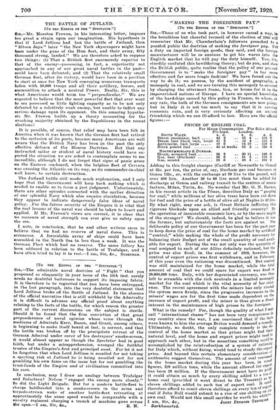'THE BATTLE OF JUTLAND.
[To ma Emma or THE " Simerwroa."1
Faa,—Mr. Moreton Frewen, in ids interesting letter, imposes too great a strain upon our imagination. His hypothesis is that if Lord Jellicoe had lost the battle of Jutland, then "fifteen days" later "the New York skyscrapers might have been under the guns of the Hun fleet, and their army, fifty thousand strong, landed." We are therefore asked to suppose two things: (1) That a British fleet enormously superior to that of the enemy—possessing, in fact, a superiority not approached in any of our great naval battles in the past— could have been defeated; and (2) That the relatively small German fleet, after its victory, would have been in a position to start at once for 1%rew'York convoying numerous transports laden with 50,000 troops and all their artillery, horses, and ammunition to attack a neutral l'ower. Really, Sir, this is what Americans would term too "perpendicular." We are expected to believe that the most powerful fleet that ever went to sea possessed so little fighting capacity as to be not only defeated by a relatively weak enemy, but unable to inflict any serious damage upon its opponent. On this amazing hypothe- sis Mr. Frewen builds up a theory accounting for the crushing majority obtained by the Republicans in the recent elections!
It is possible, of course, that relief may have been felt in America when it was known that the German fleet had retired to the seclusion of its ports, because many Americans are well aware that the British Navy has been in the past the only effective defence of the Monroe Doctrine. But that any instructed sailor or student of naval history could have ex- pected the situation we are asked to contemplate seems to me incredible, although I do not forget that signs of panic arose on the Eastern sea-board, when the helpless fleet of Cervera was crossing the Atlantic on its way, as its commander-in-chief well knew, to certain destruction.
The Jutland battle still needs much explanation, and I only hope that the Government will keep back nothing which is needed to enable us to form a just judgment. Unfortunately. there are other episodes connected with the earlier direction of our splendid Navy which also require elucidation, because they appear to indicate dangerously false ideas of naval policy. For the future security of the Empire it is vital that the real lessons of the naval war should be taken to heart and applied. If Mr. Frewen's views are correct, it is clear that no measure of naval strength COLD ever give us safety upon tho sea.
I note, in conclusion, that he and other writers seem to believe that we had no reserve of naval force. This is erroneous. A formidable array of ships could have been assembled in the North Sea in less than a week. It was the German Fleet which had no reserve. The same fallacy has been adduced in relation to the battle of Trafalgar, and I have often tried to lay it to rest.—I am. Sir, etc., &DENHAM.






































 Previous page
Previous page